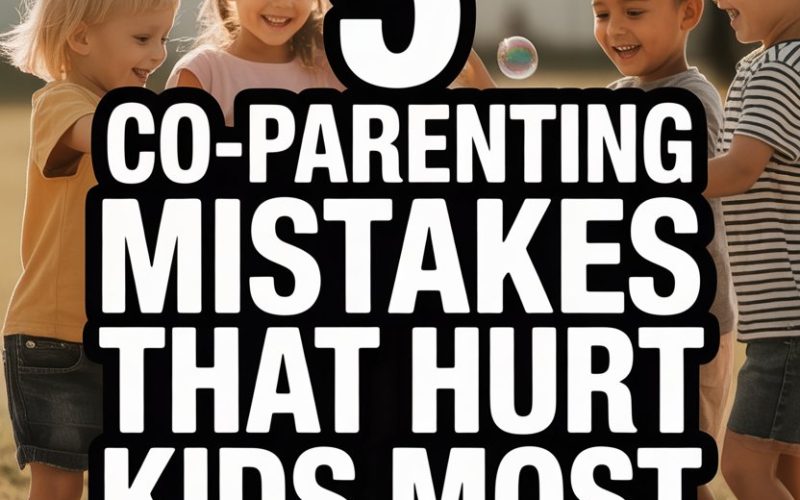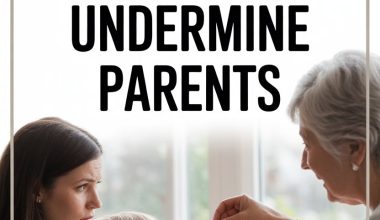Parenthood is one thing; co-parenting is quite another. Add in busy schedules, tired brains, and the leftovers of a relationship that’s, well, no longer together, and it’s a wonder we manage to put anyone’s shoes on the right feet.
Yet, no matter your ex’s texting habits or your own need for caffeine, the goal is the same: raising secure, happy kids.
But sometimes, even the most well-meaning parents fall into traps that do more harm than good.
Here are five missteps that trip up even the best of us—and how to dodge them, even on a Tuesday when you’re on your third cup of coffee.
1. Talking Badly About Your Ex (Even When They Deserve It)
You may be tempted to throw your ex under the bus, especially if that bus seems to be idling nearby. After all, who else leaves socks everywhere and thinks “on time” means next Thursday?
But here’s the kicker: children see themselves as half of each parent.
When they hear one parent bashing the other, they internalise it. They start to wonder, “If Dad’s so useless, is half of me useless too?” Self-esteem? Straight out the window.
Research from the American Psychological Association found that children caught in the crossfire of parental conflict often struggle with anxiety and even depression.
Even seemingly harmless comments (“Your mum’s always late”) can become emotional baggage.
Instead, try the “neutral news anchor” approach. Present facts, leave opinions at the door, and save the venting for your WhatsApp group chat or a willing friend.
If you feel a snarky remark bubbling up, imagine your child repeating it at school. That usually does the trick.
2. Turning Kids Into Messengers or Spies
It’s tempting, isn’t it? “Tell your mum I need my toolbox back.” Or the classic, “Did your dad have anyone over this weekend?”
Suddenly your child is playing postman and detective, when really, they should be worrying about getting paint out of their hair.
Passing messages through children puts them in the middle—a place no child should be. This often leads to anxiety, confusion, and sometimes, a sense of responsibility for adult problems.
Kids aren’t carrier pigeons, and they certainly aren’t trained in conflict resolution.
Experts, including those quoted in this Child Mind Institute article, stress the importance of direct communication between adults. It doesn’t have to involve heartfelt phone calls.
There are entire apps designed for parents to communicate without airing the details in front of the kids—think OurFamilyWizard or even a shared Google calendar (with emojis, if you must).
Keep your little ones out of the information superhighway. If you have a message, send it yourself—preferably without sarcasm or interpretive dance.
3. Playing the Blame Game During Handovers
There’s nothing quite like the car park handover. Will it be a smooth exchange, or will it end with someone muttering about forgotten trainers and missed school lunches?
Some parents use this time to air grievances, usually within earshot of the kids.
These moments can leave children feeling torn or even responsible for the tension. They might think, “If I’d remembered my backpack, Mum wouldn’t be upset with Dad.”
Suddenly, a forgotten lunch spirals into a crisis of self-worth.
Studies, like the one highlighted by University College London, have shown that exposure to parental conflict—especially during transitions—can increase behavioural problems and lower resilience in children.
The solution? Keep handovers as uneventful as a queue at the post office. If a difficult topic needs discussing, text or email about it later. Or, if you must fume, do it to the steering wheel after the fact.
Keep the focus on your child, and not on that forgotten school jumper.
4. Competing for Favourite Parent Status
Sometimes, co-parenting feels like an endless audition for “Parent of the Year” (complete with bribes, late bedtimes, and ice cream for breakfast).
Whether it’s guilt, competitiveness, or just wanting to see your child grin, it’s easy to slip into the role of the “fun parent” or the “strict parent”—and let’s be honest, one of those gets a lot more hugs.
When parents slip into this trap, children quickly learn how to play one off the other. They may get the message that rules are flexible or that love is something to be won or lost.
This can lead to insecurity and anxiety, rather than the sense of stability every child craves.
Family therapist Dr. Laura Markham points out in her advice at Aha! Parenting that consistency between households is key.
Aim for routines that align—bedtimes, screen time limits, even expectations around tidying up. You don’t have to agree on everything, but a little coordination goes a long way toward helping kids feel secure.
No need for a competition. No one’s giving out gold medals for the most extravagant Saturday.
5. Letting Guilt Dictate Your Parenting
When a family splits, guilt often moves right in, making itself a nice cup of tea and settling down on the sofa. Guilt can lead parents to say yes when a no is needed, skip boundaries, and smother with affection, possessions, or (worse) a total absence of rules.
While you might feel better in the moment, children thrive on clear boundaries and predictable routines. Spoiling them or turning a blind eye to bad behaviour doesn’t help in the long run.
In fact, child development experts note that inconsistent discipline and expectations can leave children feeling insecure, anxious, and even less loved—exactly the opposite of what you’re aiming for.
Tough as it is, try to set aside your guilt. Instead, focus on creating an environment where your child knows what to expect—yes, even if it means limiting screen time or insisting on vegetables. (No one ever said carrots are easy.)
Making It Easier on Your Kids (and Yourself)
No one nails co-parenting 100% of the time. You’ll have days when you’re secretly grateful the kids are off to their other parent, and evenings when you stare at socks on the floor and wonder how you got here.
Every misstep is a chance to reset, recalibrate, and show your children what resilience and healthy relationships look like—even after things don’t go as planned.
Direct communication, respect, and a touch of self-awareness are your best allies.
So, keep the sarcasm for your group chat, the handovers civil, and the routines as reassuring as a favourite bedtime story. Your children will thank you—eventually, probably after they get over being told to turn off the telly.





